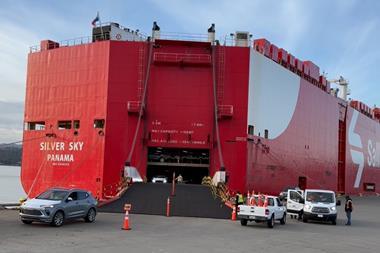
As Sam Cooke sang, “a change is gonna come.” While he may not have been singing about the possible fourth industrial revolution – or Industry 4.0 – everyone at this year’s Automotive Logistics Europe conference in Bonn was in agreement that digital technology was changing the automotive industry in significant and varied ways. The applications and terms are wide and varied. Whether it is big data, cyber-physical systems, service-based architectures, agent-based systems, smart devices, the internet of things, Google Glass, social media, cloud computing, or RFID – they are all expected to have an impact on the automotive industry and its supply chain.
Industry 4.0 is one of those terms that can cause confusion. Simply put, it is a collective term embracing a number of autonomous, data exchange and manufacturing technologies.
Christian Schwede, head of department at Fraunhofer Institute of Material Flow and Logistics (IML), explained that autonomy was the core aspect of Industry 4.0. Although there are concerns about potential job losses, Schwede believes that these technologies will be good for workers, allowing them to become more flexible in their decisions. He explained that humans would be able to better plan, control and interact in their daily jobs. And the things they work with would gain more of their own autonomy: for example, he cited racking systems that can order supplies autonomously; bins that know their own content and control processes; containers that can organise loads and routes on their own; and trucks that can transport goods without a driver. All of these technologies are to some degree already possible and are expected to become features of the supply chain over the next decade or more.
Logistics in the driving seatLooking ahead, it is hard to see just how much the industry will change as these technologies develops, but things will definitely be shaken up. “Industry 4.0 turns businesses upside down: you have to make different decisions depending on your environment,” said Frank Vorrath, vice-president of global supply chain for Johnson Controls. “Look into if you want to be disrupted, or be a disrupter,” he added.
Schwede said automotive was one of the industries leading the way in the fourth industrial revolution, with manufacturers investing in new technology. Maciej Iwaniuk, manager in operation technology and the internet of thing advisory at EY, added that one of the reasons automotive was leading the way is that the industry is accustomed to change. “This is why there is a lot of willingness to go to new things and use technology,” he said. “It's natural for automotive.”
Moreover, Schwede said, it is automotive logistics that has taken a lead in many ways. “There have actually been few developments in production. Most people think it's coming from there but it's coming from the logistics side, with AGVs, etc. There is huge potential for logistics to keep up with this.”
However, there are a few challenges when embracing this industrial revolution. Logistics companies have low margins, and it is difficult for the logistics divisions at manufacturers to find the money to invest in innovation. It needs to be a collaborative effort. “To find room to do these things and the money, it's about getting things done together,” Schwede said.
Vorrath agreed that collaboration on some level was needed. “We can't do things independently from each other. We need to think about creating value together.” He suggested the financial difficulties many companies have faced may have also made them readier to change. “This forces us together to have different conversations about who owns what asset and who is investing what. I know that sounds difficult to create but I strongly believe we would find ourselves in a different environment – and we have to get there,” he added.
Collaboration could take away some of the risks associated with new investment. Michael Gorny, manager of vehicle planning for Opel/Vauxhall, said: “When you apply new technology, you need to make sure it's working. There's no room for experiments.”
However, despite the lack of wiggle room for experimentation, he said the automotive industry would be going through some exciting technological changes in the coming decade. RFID technology, for example, starting to gain more use, including at Opel's own vehicle compounds at assembly plants, where the carmaker is automatically capturing vehicle movement with RFID on a compound management system. “We had to manually scan vehicles entering the yard,” said Gorny. “Now, using an RFID tag which is attached at the end of the production line, it can be measured at all stages.”
Schwede said the sheer pace of technological advancements was the biggest challenge for logistics. “Speed becomes a competitive advantage. You have to keep up with innovations and sometimes it's beyond your control. It's about creating value for your end,” he said.
In a way, the move towards Industry 4.0 is a step into the unknown. Around 90% of all data was created in the last two years and figures suggest that by 2020, there will be 30 billion 'things' connected to the internet. How this will affect automotive logistics is not fully known, but those in the industry seem excited and optimistic at the prospect of technology helping to achieve greater efficiency, save money and improve functionality.
For a full report from Automotive Logistics Europe, click here.
To see video presentations of the main sessions, click here.



































